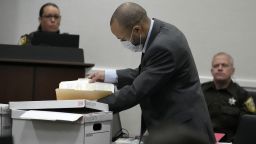Darrell Brooks told jurors Tuesday during closing arguments he did not intentionally plow a SUV through a Christmas parade in Waukesha, Wisconsin, last year, which left six dead and dozens more injured.
Brooks has been representing himself during this roughly three-week trial. He tearfully asked jurors during his 50-minute closing argument to consider whether the car could have malfunctioned during the incident last November and the effects the trial – along with the negative press – has had on his family.
“What if the vehicle couldn’t stop because of malfunction? What if the driver of the vehicle was unable to stop the vehicle? Because of that fact, what if the driver may have panicked? Does that make the driver in a rage and intent on killing people?” Brooks asked, claiming there was a recall on the vehicle he drove that day. Waukesha County Judge Jennifer Dorow struck those comments from the record.

“I’ve never heard of someone trying to intentionally hurt someone while attempting to blow their horn while attempting to alert people of their presence,” Brooks said.
The defendant went on to repeatedly allege there had been “misconceptions” and “lies” told about him during the trial. After saying that his conscience is clear and that he had made peace with God, Brooks spent much of the final 10 minutes of his closing remarks repeatedly telling the jury to be at peace with their verdict and not to have any regrets.
“Whatever you decide, make sure you yourself can live with it. That’s the magnitude of the power that you have,” Brooks said. “Be at peace with what you decide.”
Waukesha County District Attorney Susan Opper rebutted Brooks’ claims, saying he wants jurors to care about his family when other families in this tragedy will never be able to see their loved ones again.
“There are 68 victims in this case, folks. That’s not an accident,” Opper said.
Despite Brooks’ claims of him not intentionally striking people with an SUV, Opper repeatedly told the jury there is overwhelming evidence showing Brooks was fully aware of his actions when he drove his SUV through a crowd of hundreds of people.
“He reached speeds of approximately 30 mph. That’s intentional. He plowed through 68 different people, 68. How can you hit one and keep going? How can you hit two and keep going?” Opper asked.
Opper also told jurors not to be distracted in their deliberations by the conduct of Brooks during the trial.
“You must not, not, not consider anything about Darrell Brooks other than his conduct in downtown Waukesha on the evening of November 21, 2021,” Opper told the jury. “Nothing he’s done before that, nothing he’s done since that. When you go back to that deliberation room, please obey Judge Dorow. Confine your comments to his conduct on November 21.”
Jurors will now deliberate whether to convict Brooks. After deliberating for an hour and 45 minutes Tuesday, the jurors completed their first day of deliberations without reaching a verdict. The jury is expected to return to court to continue their deliberations on Wednesday at 9:30 a.m. ET.

Brooks pleaded not guilty to more than 70 charges, including six counts of first-degree intentional homicide. He previously pleaded not guilty by insanity, but his public defenders withdrew the insanity plea in September. The attorneys later filed a motion to withdraw from the case, and the judge ruled to allow Brooks to represent himself at trial.
Brooks’ unusual decision to represent himself in court and his persistent disruptions along outlandish behavior have caused constant disruptions throughout the trial. He has spoken over prosecutors and the judge, asked vague questions, challenged the court’s jurisdiction and declared “Darrell Brooks” is not his name.
Judge Dorow has repeatedly removed Brooks from the court for his outbursts and placed him in a nearby courtroom, where he can communicate via a monitor and microphone which is most often muted.
CNN’s Eric Levenson contributed to this report.





